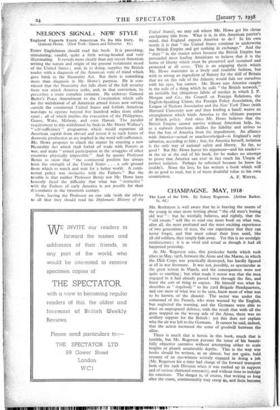NELSON'S SIGNAL : NEW STYLE
England Expects Every American To Do His Duty. By Quincey Howe. (New York : Simon and Schuster. $2.)
Emu Englishman should read this book. It is provoking; stimulating, candid, quite a little wrong-headed and very illuminating. It reveals more clearly than any recent American writing the nature and origin of the present isolationist mood of the United States ; and, in so doing, supplies the British reader with a diagnosis of the American state of mind which gave birth to the Neutrality Act. But there is something more than diagnosis in Mr. Howe's purpose. He is con- vinced that the Neutrality Act falls short of the full security from war which America seeks, and, in that conviction, he prescribes a more complete isolation. He endorses General Butler's Peace Amendment to the Constitution which calls for the withdrawal of all American armed forces now serving outside the continental United States and forbids American Warships to operate beyond five hundred miles from either. coast ; all of which implies the evacuation of the Philippines, Guam, Wake, Midway, and even Hawaii. The parallel- requirement to this withdrawal he finds in Mr. Henry Wallace's. " self-sufficiency " programme which would repatriate all American capital from abroad and invest it in such forms of domestic production as are implied in the word self-sufficiency. Mr. Howe proposes to clinch the matter by enacting a new Neutrality Act which shall forbid all trade with Powers at war, and make " armed participation in the struggles of other. countries physically impossible." And he quotes Professor Bemis to show that " the continental position has always- been - the strength of the United States . . . a safe ground from which to watch and wait for a better world. A conti- nental policy was instinctive with the Fathers." But the trouble is that neither Professor Bemis nor Mr. Howe have honestly faced the difficulty that what was " instinctive" with the Fathers of early America is not possible for their descendants in the twentieth century.
Now, leaving the Professor on one side (with the advice to all that they should read his Diplomatic History of the. United States), we may ask where Mr. Howe got his clever catchpenny title from. What is it, in this American patriot's mind, that England expects America to do ? In his own
words it is that " the and States continue to underwrite . the British Empire and get nothing in exchange." And the " duty " in the matter arises because the British Empire has persuaded most leading Americans to believe that it is the home of liberty which must be preserved and sustained and protected at all costs. This is an engaging thesis which Mr. Howe maintains in a lively and readable fashion, but with so strong an ingredient of flattery for the skill of Britain that we on this side of the Atlantic would fain see ourselves with his eyes, but cannot. Mr. Howe sees America caught in the toils of a thing which he calls " the British network," an invisible but ubiquitous fabric of meshes in which J. P. Morgan and Co., the Council on Foreign Relations, the English-Speaking Union, the Foreign Policy Association, the League of Nations Association and the New York Times (with Harvard University now and then lending a hand) weave an entanglement which binds America to the ultimate purpose of British policy. And since Mr. Howe believes that the British Empire cannot survive without American help, he, as a stalwart American, dislikes the liability and strives to free the feet of America from the impediment. An alliance with America—actual or unacknowledged—is England's only salvation, according to him ; but, for America herself, isolation is the only way of national safety and liberty. So far, so good ! But Mr. Howe leaves his argument—and his reader— in the air at the end of his book, for he makes no attempt to prove that America can ever in fact reach his Utopia of perfect isolation. Perhaps he refrained because he knew he , couldn't. None the less, he has written a book which will do us good to read, but is of more doubtful value to his own









































 Previous page
Previous page